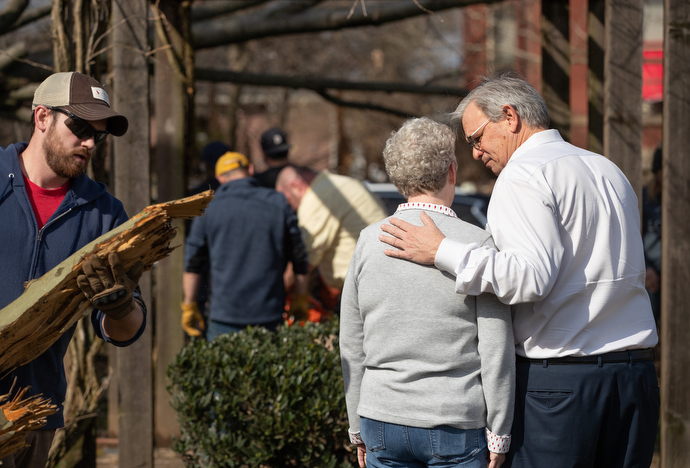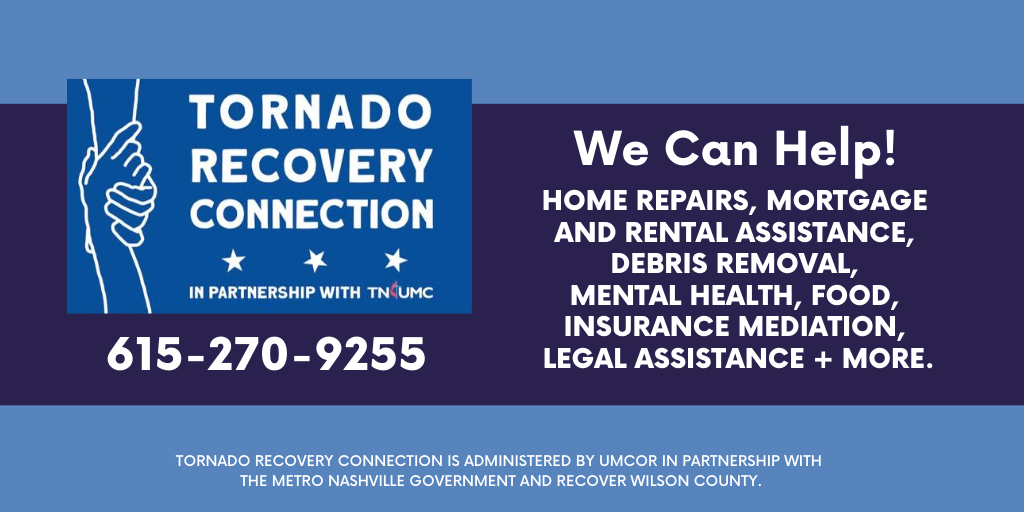For decades, UMCOR Arrives After Disaster Strikes
UPDATED 03/01: The following story includes original reporting, as well as updated information provided by CFMT and UMCOR’s Tornado Recovery Connection Director, Eileen Lowery.
The Tennessee Conference of the United Methodist Church Disaster Response Ministry (UMCOR) received a $50,000 grant to initiate case management resources for long-term recovery following the March 2020 tornadoes.
Responding to disasters has been a part of the mission of the United Methodist Church long before “United” was added to “Methodist Church.”
Under its original name, The Methodist Committee on Overseas Relief (MCOR) was founded in 1940 by the Bishop Herbert Welch (1862-1969) in response to displaced and vulnerable populations in the wake of World War II. In his address at the General Conference that year, Bishop Welch stated that MCOR would serve as a “voice of conscience among Methodists to act in the relief of human suffering without distinction of race, color, or creed.”
This mandate remains true to this day. The organization’s name was legally changed to The United Methodist Committee on Relief (UMCOR) at the 1972 General Conference.
When deadly and destructive tornadoes struck Middle Tennessee in early March, dozens of UMCOR-trained volunteers began working to help in devastated neighborhoods.
Angela Overstreet, a UMCOR consultant and trainer based in Nashville, provided immediate assistance to the Rev. Robert Craig, disaster response coordinator for the Nashville Episcopal Area of The United Methodist Church. Craig and Overstreet met with other agencies in the area to begin coordinating response efforts.
“Our trained early response team members have responded quickly across the conference, where so much destruction is left in the wake of the tornado …,” Bishop William T. “Bill” McAlilly, bishop of the Nashville Episcopal Area, wrote in a conference update posted on the UMCOR website. The area includes the Memphis and Tennessee Conferences that cover Middle and West Tennessee and Western Kentucky.
“Leaders are stepping up offering help and hope. Numerous conferences are inviting offerings to support our response efforts,” the bishop continued. “We are so very thankful for all of this support.
“UMCOR teaches us that disaster response is long term. Our team is working on infrastructure to build a team that can go the distance on what will be a long-term recovery effort.”
Before UMCOR staff prepared to go the distance, many of their volunteers didn’t have to travel far.

Three area United Methodist churches — East End and Braden Memorial in East Nashville and Dodson Chapel in Hermitage — were heavily damaged by the tornadoes.
East End United Methodist Church had weathered storms before. When an F3 tornado ripped through East Nashville in 1998, it only managed to blow the sanctuary doors open.
This time, the damage was more severe. Much more severe.
“It’s in our DNA to be a church of open doors,” the Rev. Judi Hoffman, East End’s co-pastor, told UM News. “But they flew right off the hinges this time.”
Eileen Lowery, UMCOR’s Tornado Recovery Connection director, responded to questions from The Community Foundation
CFMT: How have you been utilizing the tornado emergency response grants?
UMCOR: The Community Foundation provided a significant grant that gave us the ability to hire 12 caseworkers who initially responded by reaching out to survivors. To date we have made contact with nearly 2,500 survivors through the American Red Cross, several county organization referrals, community canvassing events, and our helpline. Caseworkers were able to connect survivors with community resources to help address immediate and pressing needs. We have since hired and trained 15 staff members who are currently providing Disaster Case Management to walk alongside survivors with more long-term needs for the duration of the survivors’ recovery.
CFMT: Describe the history of UMCOR and disaster training and how it has shaped your response to the March tornadoes.
UMCOR: The United Methodist Committee on Relief (UMCOR) is a nationally recognized disaster relief organization. We are blessed to have two UMCOR consultants who live right here in Nashville. Christy Smith and Angela Overstreet have been a great resource in providing direct support and training of our staff to better help and serve survivors. Their knowledge and experience from years of disaster response throughout the country has been paramount in our ability to serve and help survivors be empowered in their own recovery with the support of Disaster Case Managers.
CFMT: In light of changes in how we all live and work due to the COVID-19 coronavirus, how is your organization managing to work in supporting tornado relief and recovery efforts? What challenges have you all overcome or are overcoming?
UMCOR: Unfortunately, this was the first disaster that had to operate as COVID-19 unfolded. As a result, we have had to adjust how staff are trained and survivors are contacted for the safety of all. What we have learned will be shaping the future of how others throughout the country will be responding in future disasters under the shadow of COVID-19.
One challenge to overcome has been that survivors have different levels of knowledge concerning technology and electronics. This has created a more diverse way of obtaining information in a multitude of ways as we meet the survivors where they are at.
We have also had to overcome lack of trust among survivors who are rightfully cautious and questioning motives of those who are wanting to help. It is sad to know that disasters can bring out those who prey on those experiencing loss, but it’s also reassuring that people are taking the extra precautions to make sure they are not being taken advantage of.
CFMT: Give a favorite example or two of your staffers or volunteers stepping up to make a difference to help people through these disasters?
UMCOR: We have such a diverse group of case managers who bring so much experience and enthusiasm. There has been the excitement of experiencing the success of helping clients overcome struggles with their insurance companies.
There’s the moment that new information is learned and a case manager, Heather Marriott, has enthusiastically dropped everything to go out to obtain a survivor’s signature that night so an appeal could be immediately sent to FEMA (Federal Emergency Management Agency).
CFMT: In terms of tornado relief and recovery, what needs remain in your community or communities for tornado relief and recovery?
UMCOR: We have found that many are in need of FEMA and Insurance advocacy in order to make the next steps toward recovery. Providing that assistance while empowering survivors in their recovery is a process. This is uncovered with many complexities when working with different systems, and survivors who are in their different stages of healing from the trauma caused by the tornado.
CFMT: Define the word “hope” for you and your organization.
UMCOR: Hope is in the hearts of the survivors who know what they are experiencing isn’t as it should be but that it will be different.
Sometimes that hope can come in the form of a listening ear of a friend or stranger. Hope can be found through a local organization that provides a need to help survivors become one step closer toward recovery.
And, finally, hope can be experienced by a survivor as a community rallies to support one another as a reminder that they are not forgotten nor alone in their recovery.
Follow up with Eileen Lowery, UMCOR’s Tornado Recovery Connection Director
CFMT: From your organization’s perspective, what progress has been made since the March 2020 tornadoes, and what more still needs to be done for survivors?
UMCOR: The Tornado Recovery Connection was birthed from the Tennessee United Methodist Church with additional training and support from the national United Methodist Church Committee on Relief (UMCOR). We have been providing case management for all survivors in Davidson and Wilson counties while providing case management for those in need of complete rebuilds in Putnam county.
Informing the community about the availability of resources for survivors has also been a journey. It was reassuring to find survivors were being apprehensive of organizations saying they are here to help and survivors being cautious of not being taken advantage of. However, as a legitimate service being provided, it forced us to be mindful of that and to create several avenues of communication from trusted partners in the community to help reinforce our legitimacy.
Our work with survivors varies depending on the needs of the survivor. Sometimes a survivor may only need a listening ear; other times it could be providing a survivor with a resource within the community; and other times it requires walking alongside that survivor while providing more in-depth and continued support. Regardless of the amount of needs a survivor has, we strive to meet the survivors where they are at and empower them in their own recovery. There’s an understanding and respect that survivors each have unique needs and may be in different phases of their recovery.
While working with survivors, we are also working very closely with multiple community organizations to help meet the needs each survivor has. Many of those needs have included food, clothing, construction, volunteers, debris removal, counseling, legal assistance, insurance and FEMA advocacy, household goods and appliances to name just a few. We’ve also witnessed those needs change as summer months led into colder months and the need to replace lost winter clothing came to surface. We have also worked with survivors who originally were actively recovering with the resources they had to only find they are in need of help with their insurance companies, or they were taken advantage of by hired contractors. This has brought survivors to us in need of community support of insurance advocacy, funds to address construction needs, and in some instances legal action for survivors to fully recover to as close to pre-tornado days as possible.
The biggest struggle has been, and continues to be, helping those in need of affordable housing. There are survivors who were living with friends and family members prior to the tornado. Those friends and family members then moved away from the area after the tornado, which then created situations of survivors going from being unhoused to homeless. Others lost their affordable housing to not be able to find rental options within their financial means. Others relied on having housing near a bus route to be able to get to work to only now not be able to find housing options near a bus route. “It has been a blessing to walk along survivors while working with community partners who are enthusiastically responsive in helping survivors and the community rebuild stronger than everyone was before. We are humbled by survivors’ extraordinary strength and recovery, while being a small part of a community serving those in need.
Tornado Recovery Connection
The Tornado Recovery Connection helpline (615-270-9255) provides tornado survivors with resources for immediate relief and helps identify those with long-term needs.
Administered by the TNUMC of UMCOR and in partnership with the Metropolitan Government of Nashville and Davidson County and Recover Wilson County, local agencies and community groups are coordinating efforts to address these needs and help our neighbors rebuild from the March tornadoes.
TORNADO RECOVERY CONNECTION PROVIDES ASSISTANCE FOR THE FOLLOWING SERVICES:
- Counseling and mental health support
- Direct financial assistance
- FEMA mediation
- Food assistance
- Home furnishings
- Home repair and construction services
- Household goods
- Housing placement
- Insurance mediation
- Legal assistance
- Mortgage assistance
- Primary healthcare services
- Rent assistance
- Short-term housing
- Short-term rental assistance
- Tree debris removal
- Utility payment assistance
IF YOU ARE STILL IN NEED OF HELP, PLEASE CALL 615-270-9255 TODAY.
We want to help you recover from the devastating tornadoes that swept through Middle Tennessee. The helpline is available 24 hours a day, 7 days a week. Case workers will follow up with you as soon as possible.
